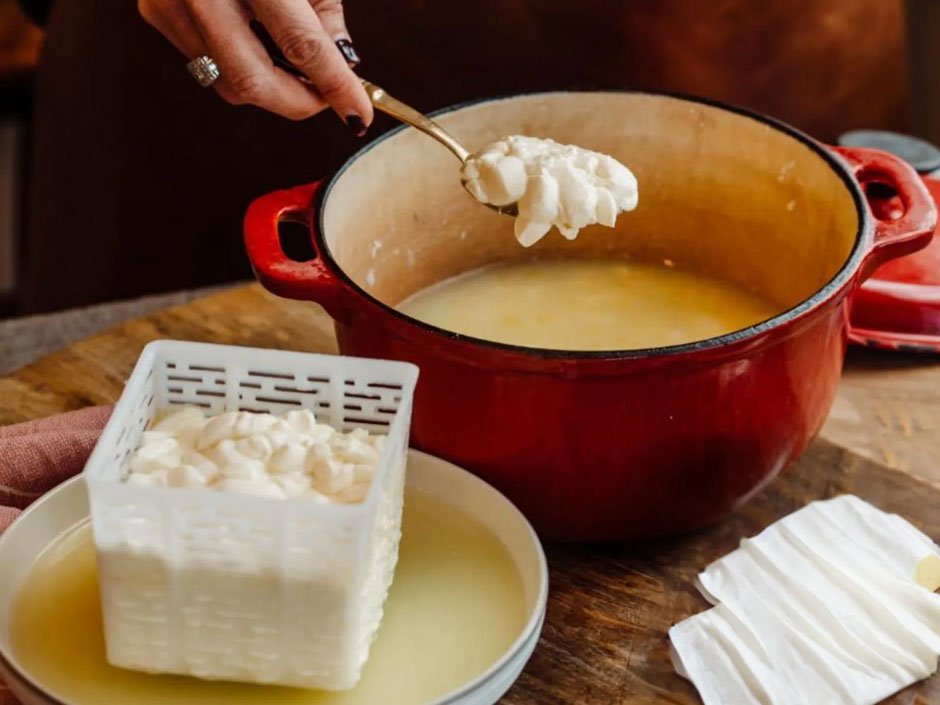 Having the right equipment is key when diving into homemade soft cheeses like ricotta or brie. A few simple tools can greatly improve the process of soft cheese making. Basic items such as a large pot, a curd cutter or knife, and a thermometer are needed to guarantee precise temperatures. Cheesecloth is also important for draining and shaping the cheese. These tools help achieve the desired texture and flavor of soft cheeses.
Having the right equipment is key when diving into homemade soft cheeses like ricotta or brie. A few simple tools can greatly improve the process of soft cheese making. Basic items such as a large pot, a curd cutter or knife, and a thermometer are needed to guarantee precise temperatures. Cheesecloth is also important for draining and shaping the cheese. These tools help achieve the desired texture and flavor of soft cheeses.
For those looking to step up their cheese-making game, there are other tools to consider. A good quality cheese mold and a cheese mat are handy for shaping and maturing the cheese properly. Some cheese makers also recommend using a small curd spoon and a pH meter for more control over the process.
For anyone looking to start a small-scale cheese-making operation at home, it’s helpful to look into products from specialists in dairy equipment. Experts provide a range of useful tools, such as pasteurizers and cream separators. These can be found at Milky Day, where they offer a wide selection of equipment to help create delicious soft cheeses right in your kitchen.
Basic Equipment for Soft Cheese Making
Soft cheese making involves precise equipment that helps maintain temperature, measure acidity, and shape the cheese. Key tools include a sturdy pot or vat for heat regulation, a thermometer for temperature control, cheese cloths and molds for shaping, and tools to measure acidity.
Cheese Vat or Pot
A good pot or vat is important for maintaining even heat distribution. Stainless steel pots are popular since they resist reactions with acidic ingredients. The pot should accommodate the milk volume without being too large, which could lead to heating issues. For home cheesemakers, a large stock pot can be used effectively.
Keeping milk at a consistent temperature is important when making soft cheeses like ricotta or brie. An easily cleaned pot guarantees sanitation, which is important in the cheesemaking process. Choosing a pot with a thick bottom is also wise to prevent scorching.
Thermometer
Using a thermometer allows cheese makers to maintain precise temperatures. Soft cheeses require controlled heat for proper texture and flavor. A digital thermometer offers quick, accurate readings, which are necessary for consistency.
Mercury and alcohol thermometers are also options. They tend to be less accurate than digital versions, but some people find them to be more durable. The cheese-making thermometer should be able to clamp to the pot’s side for easy monitoring and remain accurate through regular use.
Cheese Cloths and Molds
Cheese cloths and molds give shape and texture to soft cheeses. Cheese cloths are used to drain whey while retaining the curds. Fine mesh cloths are recommended for soft cheese to prevent curds from slipping through. They should be prewashed and sanitized to avoid contamination.
Cheese molds shape and compact the curds into a more solid form. They come in various sizes and shapes, allowing for creativity in cheese appearance. Molds with drainage holes facilitate whey removal, leading to the desired texture. Reusable molds made from food-grade materials are preferred for reliability and ease of use.
pH Meter or Acid Test Kits
A pH meter or acid test kits help determine the acidity level during cheese making. Cheese flavor and texture can change with acidity adjustments. A digital pH meter is convenient for precise readings, allowing for real-time monitoring during the cheese-making process.
For those seeking a cost-effective approach, acid test kits might be a practical alternative. These kits conduct qualitative assessments in comparison to the numerical accuracy of a digital meter. Keeping track of acidity helps cheesemakers fine-tune recipes, improving the cheese flavor profile and guaranteeing consistency.
Additional Tools for Precision and Quality
In cheese making, certain tools are especially helpful for making sure that the process goes smoothly and the quality of the cheese remains high. Paying attention to the details with specialized tools can make a big difference when crafting soft cheeses like ricotta or brie.
Curds Knife
A curds knife is a key tool in the cheese-making process. It is used to cut the curds into small pieces, which helps release whey and affects the texture of the final product. The right knife should be long and thin, allowing for straight slices through large blocks of curds. Stainless steel knives are preferred as they resist rust and are easy to clean.
The sharpness and length of a curds knife allow for precise cuts, which is especially important for soft cheeses. This tool helps determine the moisture content and final texture of the cheese. Using the proper technique, a cheese maker can control the opening of the curds, optimizing the draining process and achieving the desired softness.
Cheese Press
A cheese press is used to apply controlled pressure to cheese curds, which is particularly useful in making certain soft cheeses where a specific texture is desired. This tool allows the cheese maker to manage the amount of whey removed, impacting the firmness and density of the finished cheese. Many presses have adjustable weights, giving the user flexibility depending on the type of cheese being produced.
The press must provide consistent pressure throughout the process to create uniform cheese. For cheeses like brie, the pressure level is carefully controlled, impacting the thickness of the cheese and allowing it to develop its characteristic soft interior. High-quality presses are made from durable materials and are easy to sanitize, reducing the risk of contamination.
Aging Equipment
Aging equipment plays a significant role in the development of flavors and textures in soft cheeses. For soft cheeses like brie, aging containers help maintain the right humidity and temperature to enable the growth of molds and bacteria. These conditions are necessary for developing the unique flavors associated with these cheeses.
Aging racks and mats help with airflow around the cheese, which is important for even drying and maturation. Draining mats, in particular, aid in the removal of whey while keeping the surface of the cheese dry. Proper aging environments contribute to the rind formation, which is important for soft cheeses to achieve their intended taste and texture profile.
Conclusion
Making soft cheeses like ricotta or Brie at home can be rewarding and fun. Basic tools such as a stainless steel skimmer or slotted spoon are helpful for handling curds. Additionally, a digital thermometer guarantees accurate temperature control during the cheesemaking process.
Molds provide the desired texture and form for shaping soft cheeses. These are particularly useful when making cheeses like Camembert and Brie, which require specific forms to achieve their characteristic textures.
Beginners can use cheesemaking kits tailored for different experience levels. These kits generally include ingredients and tools that simplify the process, making it accessible for those just starting out.





Leave a Reply